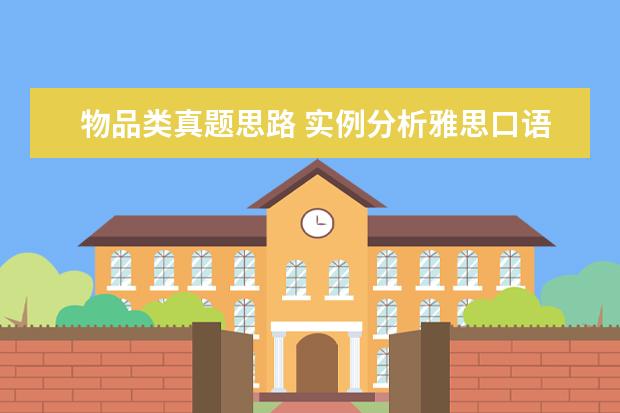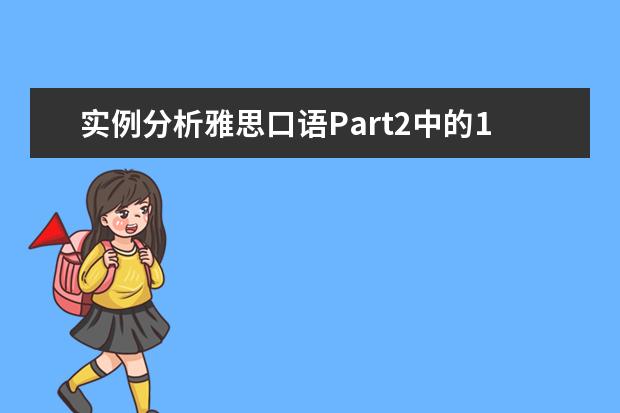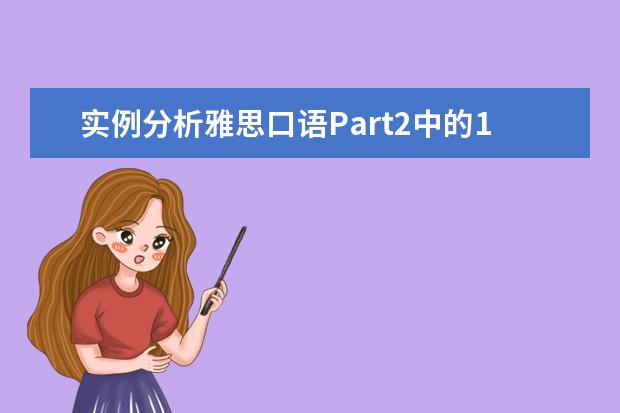当前城市:淄博[切换]
- 手机雅思无忧

扫码登录
雅思考试主要是通过对考生听、说、读、写四个方面英语能力的考核,综合测评考生的英语沟通运用能力,实现“沟通为本”的考试理念。对于雅思考生来说,也有很多考试难点和政策盲区需要帮助解答。今天雅思无忧网小编准备了物品类真题思路 实例分析雅思口语Part2中的10大难点真题,希望通过文章来解决雅思考生这方面的疑难问题,敬请关注。
雅思口语1-4月轮换话题例题一:Describe a book you want to write
You should say:
When you had this idea
What kind of book you want to write
What the book is about / Is it a difficult or easy
And explain why you want to write this kind of book
我的建议可以是把旅游这个大家常见的话题引入到这个题目中来,所以是a book for individual traveller
按照题目四个提示点,可以参考的内容如下:
1. When you had this idea
- my dad used to be a well-travelled person...
- travelled widely across the world…
- never ever joined a tour group… made all the timetable on our own…
- had accumulated much experience…
2. What kind of book you want to write
- a brief guide to all the individual travellers (those who would like to travel alone)
- could be a bestseller… not many similar books in bookstore…
3. What the book is about / Is it a difficult or easy
- tips and shortcuts for having a trip within the budget…
- e.g. book the flight tickets from budget airlines… / find the best rate for hotel and accommodation / look for airport pick-up or day tour
- won’t be an easy task … want to differentiate with other books … quotemore personal experience
of other travellers … interviews would be necessary
4. And explain why you want to write this kind of book
- quite costly to travel alone … have no partner to share the cost… not really ideal for students
- no flexibility for the timetable … if you join the tour group… visit the sightseeing places which are usually packed with traffic and crowds…
- share my experience… travelling shouldn't be a luxury … could be low-cost
这题算是给大家提供一个新的素材,其实如果拿旧题中的学习外语这个题目,也可以拿来套用哦,例如说自己从小开始学哪一门外语获得经验可以分享等等。
雅思口语1-4月轮换话题例题二:Describe something lost by others but found by you
You should say:
Who it belonged to
When it was lost
How the person lost it / How you found it
And explain how you felt about it
我们依旧采用和旅游相关的话题,但是这次把场景换到机场,可以说一下准备出发旅行的时候护照丢了…
按照题目四个提示点,可以参考的内容如下:
1. Who it belonged to
- before my friends and I started off our trip in last summer holiday
- in order to finish the check-in process quickly …
- gave all our passports to one of my friends…
2. When it was lost
- before we headed for the security check…
- couldn't find it… wouldn't be able to go through the customs as well a*oarding the aircraft
- felt anxious… we could even hear the final call of our flight … not much time left for boarding…
3. How the person lost it / How you found it
- couldn’t figure out how he lost it… had no clear memory after we left the check-in counter…
- checked all the backpacks and hand carry luggage… found it a *all suitcase…
- totally forgot he had put the passports inside the bag while he was talking to the staff at the check-in counter…
4. And explain how you felt about it
- such a big relief… rushed to the boarding gate and eventually got onboard in time
- so scared that we couldn't make it… quite exhausted as well
- a reminder for the trip later on… needed to take good care of personal belongings… always double-checked the important travel documents…
其实这个题目也可以和事件类题目中的change plan进行套题哦
Part 3例题分析
首先我们先快速复习一下。 简单来说,Part3的思路大家可以按照以下几种思维方式来进行:
a.提出观点并给出理由
b.不同情况对比
c.提出优缺点并对比
d.提出问题以及解决方案
但是不管如何,再次强调各位还是需要多讲细节和举例,而不是一直说很笼统的大道理哦
雅思口语1-4月轮换话题例题一:What kinds of writers are considered to be good?
-Those who could keep the readers interested throughout the book… particularly the full-length novel
-Need to be full of twists and turns for the plot… otherwise… would be very likely to give up reading …
-Not an easy job for inexperienced writers … not so many of them could be qualified as good writers…
雅思口语1-4月轮换话题例题二:Do people collect thing for maintaining memories?
-It is a sure thing… especially for the elders…
-not good at utilising modern technology like the youngest
-e.g. going for a tour… have no digital camera with them… not to mention managing the photos on electronic devices… without the assistance of young people
-collect souvenirs for the memory of the trip… e.g. postcards or magnets
总结
以上思路都是参考,重点还是大家尽可能的多多练习!很多问题练多了自然会改善甚至解决。
同时也多预留口语的准备和练习时间,建议同学们至少出一个月的时间进行练习和思路整理,流利的口语一定是练出来说出来的,而不是背出来或者写出来的!
实例分析雅思口语Part2中的10大难点题目为你带来在雅思口语的第2部分当中,难度较高的10个题目以及它们的难点分析及破解方法。雅思口语分为3个部分,第1个部分是暖场部分,由一些简单的话题和自我介绍组成。第2和3部分将就考生抽到的话题进行深入的对话。所以对于part2和3,我们需要提前做话题的积累,碰到难度大的话题,我们应该怎么办?这里以10个难题为例,告诉大家破解口语难点的策略。
Part 2中考生们普遍认为的难题主要难在以下三个方面:
1. 考生对该话题缺少熟悉度;
2. 考生对该话题的理解容易造成偏差;
3. 话题本身相对抽象。
不熟悉的话题如并未亲身经历过的事件或并未拥有过的东西常常会造成考生最害怕的结果:无话可说,难以开口;如果对话题的理解有偏差,即便一直在说,也会文不对题,且中途无人指正,容易越说越偏,找不到重点;相对抽象的话题易使考生说不到具体的点,考官听不到“故事”,分数自然也就上不去。下面列出今年考试中许多考生心中Part 2的十道“最难”题,不妨来探讨一下它们的难点所在和应对方法。
口语Part 2中最难的10道题:
NO.1 A Good Law
NO.2 A Historic Site
NO.3 A Success
NO.4 A Place Not Polluted
NO.5 A Stage of Your Life
NO.6 A Sculpture/A Work of Art
NO.7 A Musical Instrument
NO.8 An Educational Trip
NO.9 A Change
NO.10 An Electrical/Electronic Product
解决方法
NO.1 A Good Law
Describe a (piece of) (good) law in your country.
You should say:
what the law is
how you first learned about this law
who benefits from this law (or, who is affected by this law)
and explain why you think this is a good law
话题类别:Object
难点解析:众多考生公认的难题。平时即使比较关注法律,但真的要具体去谈,即使用中文有条有理地说出来也会有难度。相对Part 3可能由此展开的法律的重要性、公平性、适用性等较概括的讨论,Part 2的具体化让考生们尤为头疼。
备考策略:首先可以避免谈到那些广而深的法律如刑法,因为这样的法律既不容易说清楚,也不容易说具体。其次,一些全世界都较为普遍的法律法规如交通法可供考生选择,因为它们相对比较融入自己的生活,也就比较好发挥。当然,选择比较有中国特色的法律来展开就更好,比如计划生育政策”one-child policy”,在中国人口众多的基本国情下,它所带来的好处以及受益人也会相对好描述,考官也可以从中获取一些新的信息。
NO.2 A Historic Site
Describe an interesting historic site (in your country) that you visited.
You should say:
where it was
what you saw at this site (or, what it looked like)
what role it played in history
and explain what interested you about that place
话题类别:Place
难点解析:对于历史建筑的描述,在强调它的历史作用时多少会涉及到历史作用时多少会涉及到历史知识以及一些专有名词的表达。而不管是选择中国的还是国外的历史建筑,鉴于平日里谈论得极少,考试前没有足够的准备就很难开口。
备考策略:考前可以结合其它描述地点或建筑的话题一起准备:Describe a museum/an old building/your favorite building/an important traditional building等,例如北京故宫里的建筑,即是古老而传统的建筑,又是很重要的博物馆,也可以是自己最喜欢的建筑。甚至还可以把它放到Describe the best tourist attraction in China,或者可以描述里面的an interesting exhibition,所以只要提前做好充足的功课,遇到其它问题也都可以迎刃而解。
NO.3 A Success
Describe a particular success you would like to achieve (in the near future).
You should say:
what it is
how difficult you think it will be
what you should do to prepare for this
and explain why you want to succeed in doing this
话题类别:Object
难点解析:看似抽象的题目,其实问题是非常具体的。考生往往容易从抽象的地方入手,譬如先谈自己对成功的定义和理解,导致在有限的时间内却不能将自己短期的目标阐述得详细和具体。
备考策略:人们怎样定义成功其实通常都是在Part 3里对于该话题的延续性讨论,在Part 2里一定要根据题目所给的线索开门见山地提出自己的成功目标,譬如想要获得学校的某个奖项,或者想要完成工作中的某个项目,然后描述目标的困难性何在,如何去准备,以及实现这个成功后的意义等。这样话题的描述才会有完整性可言。
NO.4 A Place Not Polluted
Describe a place which is not polluted.
You should say:
where this place is
what it looks like
what kind of place is not polluted
and explain what you think about pollution
话题类别:Place
难点解析:如今,在我们工作和生活的环境当中,要描述一个被污染的地方容易,但要描述一个没有被污染的地方就比较难了。众所周知,现在的环境污染问题之严重,乃至于大家都已经习惯了,平日里很难接触亦或是有机会去到更像是世外桃源般的没有被污染过的地方。
备考策略:从题目的细节可以看出,这样的地方也并不是一定要自己亲自去过才能描述的,杂志上,电视节目上曾经介绍过像原始氏族部落聚居的周边地区或无人居住的自然区域都可以描述。考生还可以探讨这些地方没有被污染到的原因,如何保护它们继续不受污染等相对宽泛些的方面。
NO.5 A Stage of Your Life
Describe an important stage of your life/an enjoyable stage of your life.
You should say:
how old you were
where you were living at the time
what you were doing during this stage
and explain why you think this was an important/enjoyable stage of your life
话题类别:Event
难点解析:谈人生的某个阶段其实是相对笼统的话题,但考官需要的却是具体的回答,能够分享不同考生的不同人生。但若考生只是千篇一律地描述说自己的童年时光是快乐的,无忧无虑的,因此非常重要,而没有精彩的故事跟考官分享,那就没有达到要求。
备考策略:以前也曾考过诸如某段时光的话题,而且相对来说还比较具体,如:Describe the most enjoyable moment in your childhood/Describe a busy time in your life等等,里面考生基本都会谈到某件或某些具体的事,而这些其实都可以作为人生某个阶段的影射,描述完某些具体时刻发生的具体事情,再来总结在人生的童年阶段是无忧无虑的快乐,因此对以后开朗乐观性格的形成产生重要影响,又或是在刚毕业时是充实的忙碌,因此为事业的发展打下良好的基础等就更有说服力了。
NO.6 A Sculpture/A Work of Art
Describe a sculpture or other work of art that you have seen.
You should say:
when you saw this work of art
where you saw it
what it looked like
and explain your impression of it
话题类别:Object
难点解析:关于艺术的话题,让人感觉抽象而深奥,如果不是艺术类专业的学生,又不是雕塑爱好者,恐怕平时会少有研究。谈到此话题总是会有些畏畏缩缩。
备考策略:艺术作品包含的范围其实是比较广的,要描述一件艺术作品,可以是雕塑,可以是画作,甚至可以是戏剧或者诗歌。以前常考work of art,但现在却常具体到sculpture or drama, performance and show又或者是a traditional art,由此可见,平时一定要对艺术的常见领域有所涉猎,每个领域都能说出一两件自己熟悉的作品才能在考试时更有自信地作答。说不定以后的考题中就会考Describe a poem了。
NO.7 A Musical Instrument
Describe a musical instrument.
You should say:
what the instrument is
when and where you first play it
how you can play it
and explain why you enjoy it
话题类别:Object
难点解析:考生中,音乐爱好者应该不少,关于一首歌,一位自己喜欢的歌手或是一个favorite band or musical group,不少考生都能信手拈来,滔滔不绝,但到考试为止从没接触过任何乐器的考生却也大有人在。没有弹奏过任何乐器,甚至也没有什么音乐细胞,回答起问题来自然底气不足。
备考策略:没有弹奏过并不等于没有见过或了解过,哪怕是大家最常见的钢琴,相信大多数考生也能说上一些。不用去分析乐器的结构组成,也不用假装自己是懂五线谱的音乐系高材生,但可以幻想自己与某种乐器的美丽邂逅,因为某个特别的机会与乐器结下的不解之缘,描述乐器弹奏出的音乐给人带来的安抚或激励,这些都不需要专业的知识,只需要大胆的想象和作答时自信的神态。
NO.10 An Electrical/Electronic Product
Describe an electrical machine or device you would like to buy.
You should say:
what special features you would like it to have
where you got to know about it
how you would use this thing
and explain why you would like to buy it
话题类别:Object
难点解析:都说电脑,思维单一,缺乏个性。
备考策略:想到电子产品或电器,大多数考生会不约而同想到当下使用最广泛的电脑,但其实现在也有题目明确规定所描述的要except computer,所以如何摆脱思维的单一性是考生需要突破的。除了平时好玩的各种游戏机,辅助工作的各种电子设备,生活中层出不穷的家用电子产品也是考生可以观察的一个方向。除了描述该产品在生活中的重要作用外,还可以说想要*它并不是自己需要,而是为了减轻妈妈的家务负担,由此表现出自己孝顺的一面。
以上就是实例分析雅思口语Part2中的10大难点题目的全部内容,对于有难度的话题,要么就是话题本身的难度大,我们不了解背景知识没有说的。要么就是话题太抽象,我们不知道该怎么表达。文中的这10大口语part2难点话题基本可以分为这2类。我们可以按照文中的备考策略进行练习,攻克这些雅思口语中的难点。
更多雅思口语范文,请关注。
以上就是雅思无忧网为您准备的访问雅思无忧网(https://www.yasi.cn/),了解更多雅思考试新消息,新动态。
雅思培训 实例分析雅思口语Part2中的10大难点题目
实例分析雅思口语Part2中的10大难点题目
实例分析雅思口语Part2中的10大难点题目为你带来在雅思口语的第2部分当中,难度较高的10个题目以
2021年05月31日 08:13 实例分析雅思口语Part2中的10大难点真题 3月5日雅思考试口语真题解析
实例分析雅思口语Part2中的10大难点真题 3月5日雅思考试口语真题解析
雅思考试主要是通过对考生听、说、读、写四个方面英语能力的考核,综合测评考生的英语沟通运用能力,实现“
2023年04月22日 09:09 雅思口语高难度话题举例之体育事件类相关真题 实例分析雅思口语Part2中的10大难点真题
雅思口语高难度话题举例之体育事件类相关真题 实例分析雅思口语Part2中的10大难点真题
雅思考试主要是通过对考生听、说、读、写四个方面英语能力的考核,综合测评考生的英语沟通运用能力,实现“
2023年04月23日 20:48 实例分析雅思口语Part2中的10大难点真题 雅思口语高难度话题之法律相关真题
实例分析雅思口语Part2中的10大难点真题 雅思口语高难度话题之法律相关真题
雅思考试主要是通过对考生听、说、读、写四个方面英语能力的考核,综合测评考生的英语沟通运用能力,实现“
2023年04月24日 07:42 实例分析雅思口语Part2中的10大难点真题 a
实例分析雅思口语Part2中的10大难点真题 a
雅思考试主要是通过对考生听、说、读、写四个方面英语能力的考核,综合测评考生的英语沟通运用能力,实现“
2023年04月24日 17:24 1科技类话题真题练习 实例分析雅思口语Part2中的10大难点真题
1科技类话题真题练习 实例分析雅思口语Part2中的10大难点真题
雅思考试主要是通过对考生听、说、读、写四个方面英语能力的考核,综合测评考生的英语沟通运用能力,实现“
2023年04月25日 08:18 实例分析雅思口语Part2中的10大难点真题 5月7日雅思口语真题回忆
实例分析雅思口语Part2中的10大难点真题 5月7日雅思口语真题回忆
雅思考试主要是通过对考生听、说、读、写四个方面英语能力的考核,综合测评考生的英语沟通运用能力,实现“
2023年04月25日 09:57 实例分析雅思口语Part2中的10大难点真题 5月雅思口语Part1真题及范文
实例分析雅思口语Part2中的10大难点真题 5月雅思口语Part1真题及范文
雅思考试主要是通过对考生听、说、读、写四个方面英语能力的考核,综合测评考生的英语沟通运用能力,实现“
2023年04月25日 16:51 实例分析雅思口语Part2中的10大难点真题 photo
实例分析雅思口语Part2中的10大难点真题 photo
雅思考试主要是通过对考生听、说、读、写四个方面英语能力的考核,综合测评考生的英语沟通运用能力,实现“
2023年04月25日 22:36 实例分析雅思口语Part2中的10大难点真题 做真题
实例分析雅思口语Part2中的10大难点真题 做真题
雅思考试主要是通过对考生听、说、读、写四个方面英语能力的考核,综合测评考生的英语沟通运用能力,实现“
2023年04月26日 11:48